Talent Development Leaders play an essential role in helping their team develop soft skills (human skills) by sharing time-testing learning and concepts. This information provides foundational knowledge and skills that are essential for employee growth. However, one of the ongoing challenges in learning and development is ensuring that the valuable insights gained from these sessions are retained and effectively applied in everyday work.
We have access to more information than ever before, yet the changing nature of work, pressing problems to solve, and focus on productivity can quickly outpace the ability to retain new learning. Even before these more modern challenges made it harder to focus and acquire knowledge, there were models about learning that showed a typical erosion of knowledge days after learning. The human mind can only process a limited amount of information, most of which never makes it to long-term memory.

Does Learning and Development Need To Adapt?
Learning methods provide so much valuable information, but how do you make it stick? Training often involves ongoing sessions, but what about when these are not available or happening? Learners may forget or struggle to apply.
This was famously measured and proven by one of the most influential early experiments in psychology. Between 1880 and 1885, Hermann Ebbinghaus studied how much information can be retained after specific intervals of time. He found that within 20 minutes of studying new information, 40% is already forgotten, rising to nearly 70% by the end of that first day (Murre & Dros, 2015). This study has since been replicated numerous times, all with similar results, and that is after studying information with intentional attempts to remember it.
The approach to development is ripe for change so that it can align with how our brains process and retain information.
Enter the concept of micro-nudges, an approach to learning and development that seamlessly integrates into the daily workflow of employees. Micro-nudges are brief, focused prompts that facilitate continuous learning and improvement without the cognitive overload associated with traditional methods.
Nudges can leverage contextual, situational prompts to encourage behaviors and actions that align with organizational goals and individual development paths. Providing small, digestible pieces of information right when they are most relevant enables a more natural and effective understanding and application of new knowledge.

HUMAN SKILL PROGRAMS ARE HITTING LIMITATIONS...
- Close the widening gap between learning and on-the-job application
- Overcome the tension of pausing productivity for development opportunities
- Integrate learning so it is actually in the flow of work
- The evolution of human skill development
- What Automated Coaching™ is and how it works.

Why Are Micro Nudges More Effective For Employees?
Micro-nudges represent a tailored solution to the challenges traditionally associated with learning and development, particularly the problems of information overload and rapid forgetfulness post-training. By addressing these issues head-on, micro-nudges enhance the learning experience, making it more effective and impactful.
Consider what it’s like to use some of the most popular strengths and behavioral assessments such as Myers-Briggs®, DISC, CliftonStrengths®, or Enneagram. Most assessment results are delivered as an overwhelming, one-time data dump in the form of a 30-page PDF report.
Most people will say they gleaned a key epiphany about themselves but can’t remember their result type. One epiphany is helpful, but 99% of the value is lost.
This happens so often that the trade has a nickname for this problem—the backseat effect—whereby detailed assessment reports are never fully internalized and tossed into the backseat of one’s car. Not because the reports aren’t thoughtfully constructed or lack insight but because they are simply too much information to handle at once.
A better approach entails using automated micro-nudges, where actionable insights are delivered in small doses over a long period of time. For example, Automated Coaching™ uses this approach by delivering assessment-derived recommendations via organizational communication channels (e.g., email, Slack, Teams) on how employees should approach their tasks or interactions with teammates.
Nudges can transform hard-to-retain information into an integrated learning process that aligns with the principles of how people best learn and adapt.

Are Nudges The Solution To The Challenges Of Human Skill Development?
1. Soft Skill Development Is A Dynamic Process
There is an assumption that soft skill development is sequential and upward, whereby individuals start at a lower level of competency and progress towards a pinnacle destination. While this scaffolding approach works for technical skills, it breaks down for soft skills.
The process of soft skill development is fluid—you start in situ, with varying levels of competence across an ever-evolving list of knowledge, skills, and abilities that matter in some contexts but not others (Day & Dragoni, 2015). Therefore, when it comes to developing human skills, it must move from a static experience to a dynamic experience.
Nudges provide timely, situational guidance that allows individuals to apply and refine these skills in real-time, adapting to the evolving demands of different workplace scenarios.
2. Soft Skill Development Must Be Highly Personalized
Organizations typically approach soft skill initiatives as if everyone is similar with respect to their psychographics (e.g., traits, strengths, cognitive abilities, worldviews, etc.) and their interest in development in general (e.g., motivation to learn, leader identity, self-efficacy). While designing for the mean is efficient, it’s not effective. The goal, instead, should be to assume variability across individuals (Rose et al., 2013) and, in turn, move from overgeneralized insights to personalized insights.
For example, Automated Coaching counters this problem by offering personalized insights tailored to the unique psychographics of each individual, such as their traits, strengths, and cognitive abilities. By integrating data-driven insights into personalized nudges, learners receive specific, relevant guidance that respects their individual differences and developmental needs.
3. Soft Skill Development Must Be Actionable
Soft skill development typically happens as a one-time initiative (e.g., workshop, training, coaching session, etc.) where participants are inundated with recommendations. This approach is misaligned with information processing theory, which suggests that human beings can only process and retain a limited amount of information in one setting (Atkinson & Shiffrin, 1968).
Nudges address this challenge by breaking down information into smaller, manageable insights delivered at the point of need. To fully optimize developmental resources (e.g., time, money, energy) necessitates an approach that moves from being overwhelming to one that is digestible and actionable.
Nudges Can Make Human Skill Development A Light Lift For Leaders
In total, the problem is that soft skill development is currently a static, overgeneralized, and overwhelming experience but should instead be a dynamic, personalized, and actionable experience.
Micro-nudges are promising given that research suggests that learning and behavior regulation are optimized when the experience is customized to individuals’ characteristics and needs, situationally adaptive, integrated within one’s flow of work, and available on demand (Maity, 2019). Human beings can’t accommodate these features at scale, but technology-derived micro-nudges certainly can (Kurzweil, 1990).
Those in charge of assessments need to be realistic. People can’t internalize information like super-computers. The goal should be to deliver digestible nuggets of information at the right time and in the right place. Addressing individuals’ specific needs and contexts, micro-nudges help transform the approach to soft skill development from a burdensome task into a series of manageable, impactful interactions that promote sustainable growth and meaningful engagement in the workplace.
Proven Behavior Change Through Coaching Nudges
One of the most compelling validations for the use of micro-nudges in talent development comes from recent research findings associated with Automated Coaching™. Studies have shown that micro-nudges significantly boost self-reflection, enhance the desire for self-knowledge, and improve the capability to handle complex challenges.
Impact on Self-Reflection and Self-Knowledge: Micro-nudges are specifically designed to prompt individuals to think critically about their immediate actions and how these align with their longer-term goals and professional growth. This continual engagement not only reinforces learning but also fosters a deeper understanding of one’s strengths and areas for improvement.
Enhancing Capability to Handle Challenges: By providing real-time, contextual feedback, micro-nudges empower employees to apply soft skills in various situations, from resolving conflicts to collaborating effectively with diverse teams.
Contextualized Nudges Make Scaling Human Skills A Real Possibility
One of the most significant advantages of micro-nudges is their ability to provide real-time, contextualized feedback. This type of feedback is crucial because it ties directly into the immediate tasks or challenges employees face. By integrating learning directly into the flow of work, micro-nudges ensure that training is not only more relevant but also immediately applicable.
Moreover, micro-nudges allow for a dynamic learning experience that evolves with the needs of the employee. Automated Coaching is designed to deliver information in a way that the human brain best processes and retains data: little by little and just at the right time.
The effectiveness of micro-nudges is also evident in their capacity to encourage behaviors and actions that align with organizational goals and individual development paths. By providing small, digestible pieces of information at critical moments, micro-nudges enable a more natural and effective understanding and application of knowledge, which is vital for personal growth and organizational success.






